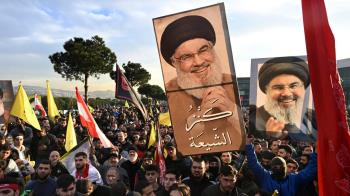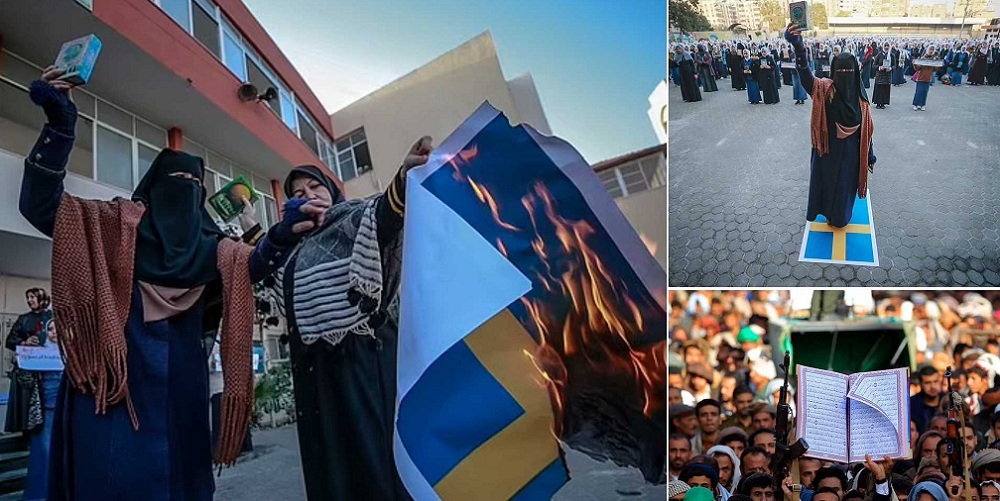Alwaght- While the Muslim world is living Eid Al-Adha holidays and the Hajj season, the shameful and inhuman desecration of the Holy Quran in Sweden has outraged millions of Muslims.
On Wednesday, a Swedish man of Iraqi descents named Silwan Momika on the first day of Eid-Al Adha tore down and burned a copy of the Holy Quran near a Mosque in downtown Stockholm in a gathering authorized by police.
The waves of condemnation of this heinous measure are unfolding and are expected to continue in the days to come. The protests have reached the heart of Europe, and certainly the Swedish government will be at the center of the Muslim fury and condemnation.
So far, multiple countries have reacted to the move, with their measures ranging from summoning the Swedish ambassadors to holding protest gatherings to blast the Quran burning.
Despite the fact that the Quran burner was of Iraqi descents, massive reactions were taken across the country.
Ahmed Al-Sahaf, the spokesman of the Iraqi foreign ministry, announced in a statement that it summoned the Swedish ambassador and expressed its strong protest against the action of the Swedish government in giving permission to extremists to burn a copy of the Holy Quran in Stockholm.
Also, the ministry asked the Swedish government to take the necessary measures in order to stop frequent desecration to the Holy Quran because freedom of speech in no way not justifies insulting sanctities.
“The desecrator to the Holy Quran has an Iraqi citizenship. So, we ask the Swedish government to hand him over to the government of Iraq to try him in accordance with the country’s law,” part of the statement read.
The office of grand Ayatollah Sayyed Ali al-Sistani, the supreme authority of Iraqi Shiites, addressed in a letter the UN Secretary-General Antonio Guterres, saying that media reported that a person in Sweden insulted a copy of the Holy Quran and tore up and torched some of its pages with the aim of insulting Islam.
“Beside condemning this act, the supreme religious authority of Iraq asks the United Nations to take effective steps to prevent the recurrence of similar incidents and to lead countries to review the laws that allow such actions to occur,” the letter read.
The capital Baghdad saw a large-scale demonstration.
Muqtada al-Sadr, the leader of Sadrist Movement, issued a statement calling for protests. In his Twitter, he reacted to the Quran burning, saying that if freedom of speech is guaranteed in the world and in Iraq, the believers should express their view and belief in front of mosques and embassies about the Quran burning.
“There should be a demonstration outside the Swedish embassy calling for expulsion of the Swedish ambassador and cutting off relations with this country,” said his Twitter post.
Following these calls, hundreds of Sadrist supporters stormed the Swedish embassy in Salehiyah neighborhood in central Baghdad.
Also, Iraqi judiciary has also stepped in the case and placed an extradition demand to the Swedish government. Faeq Zeydan, the head of Iraqi Supreme Judicial Council, has authorized the judiciary to take legal actions against the desecrator in accordance with the article 14 of Iraq's punitive law.
He also called on the attorney general to take necessary actions for extradition and trial of Silwan Momika.
Other reactions from other countries were also taken. The (Persian) Gulf Cooperation Council, consisting of Saudi Arabia, the UAE, Qatar, Kuwait, Bahrain, and Oman released a statement, condemning the move and describing it as a sign of “hatred, extremism, and malice.” The bloc called on the Swedish government's immediate action to stop such measures.
The condemnations have not remained limited to the Muslim countries, and some non-Muslim states also reacted. In the most important of them, President Vladimir Putin of Russia said that desecration of Quran in Russia, unlike many western countries, is criminalized.
According to the Russian broadcaster RT, Putin congratulated the Muslim world on Eid Al Adha, saying that Russia cares about Quran and the religious feelings of the Muslims.
“This is not common in all countries,” he was quoted as saying.
Putin added: “Quran is sacred for Muslims and others. We know that other countries do things differently. They do not respect people's religious feelings and also say that this is not a crime.”
Amid these waves of protests and condemnations, the important issue was that repeat of sacrilege was another time justified by the Swedish authorities as a sign of freedom of speech, something adding to Muslim outrage.
Lebanon's Hezbollah in a statement blasted the Quran burning, holding that “Swedish officials are accomplice to this crime because they authorized the move while in advance knowing about the dangerous intention of them.”
The movement further stated: “It is not possible to remain silent in the face of repeated attacks and insults to the Holy Quran in this country and other countries. The Swedish government should stop this regressive trend instead of hiding behind freedom of speech and other bogus slogans.”
Syria's foreign ministry also condemned the "heinous act" of insulting the Holy Quran in the same day of Eid Al-Adha, which is a Muslim religious holiday.
Morocco was another Arab country to protest the Western abuse of freedom of speech.
The Moroccan foreign ministry announced that the country has summoned Sweden's ambassador to express its strong condemnation of the desecration of the Quran in this country.
Another important reaction came from Turkey, which has opposed Sweden's membership in NATO for more than a year. It is expected that Stockholm's silence and cooperation with cultural terrorism under the guise of freedom of speech will compound its twisty path to the NATO membership with Ankara's opposition.
Turkish Foreign Minister Hakan Fidan censured the action of the Swedish police in issuing permission to extremists to hold Quran burning gathering on the first day of Eid Al-Adha.
In an online post, Fidan said: “Issuing permissions for such anti-Islamic actions under the cover of freedom of speech is unacceptable.”
This issue and the possible impacts of Quran burning on the Sweden NATO bid drew reactions from the NATO secretary-general who called on the two countries to avoid escalation of tensions.
Jens Stoltenberg in a reaction said he understands the deep feelings of the Muslims and agrees that “burning of the Quran was offensive and objectionable, but not illegal.”
In line with the Swedish officials, Stoltenberg linked the move to freedom of speech, saying: “I'm not happy with this [Quran burning] gathering but I respect the others’ right of protests.”
But worries about expansion of protests forced the Swedish government to break its silence. Prime Minister Ulf Kristersson, without any condemnation, only called for calm and described as “unacceptable” the storming of his country’s embassy in Baghdad.
The green light of Swedish officials to the desecration came two weeks after Sweden's Court of Appeals overturned the police’s decision to deny authorization to a rally meant to insult the Holy Quran in Stockholm.



























